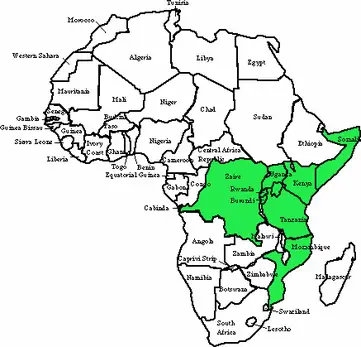Where Is The Swahili Language Spoken? (And By How Many?)
Swahili is a language of the Bantu branch of languages in the Niger-Congo language family. It is widely debated how many people in the world speak Swahili, but most estimates say between 100 and 150 million.
The Swahili language is spoken in several African countries. The major Swahili speaking countries are Tanzania, Kenya, Uganda, The Democratic Republic of Congo and the Comoros Islands. Small communities equally exist in Mozambique, Zambia, Malawi, Rwanda, Burundi and Somalia.
Historically, Swahili has been a lingua franca in East Africa, or a language used as a way of communicating across different nationalities and tribal groups who speak different languages as their mother tongue. Swahili was a language that relatively few spoke as their first language, but which a significant amount of people speak as a second language. This is still the case today, despite the growing influence of English
Swahili is the national language of Tanzania, but despite this fact, only about 10% of the population speak Swahili as their mother tongue, whereas 90% speak it as a second language. In other Swahili-speaking countries the difference is even bigger.
The Countries Where Swahili Is Spoken

Some of the countries where Swahili is spoken
Roughly 10% of the Tanzanian population of 55 million speak Swahili as their native language. This makes for around 5,5 million native speakers.
The origin of Swahili, however, was a little more to the north, namely in Kenya, where the Swahili language developed from a Bantu language called Pokomo.
One would assume that since Swahili had its origins in Kenya, this country would have a large community of native Swahili speakers. This doesn’t seem to be the case, however, and despite most of the 47 million Kenyans being fluent in Swahili, almost no one speaks Swahili at home.
In The Democratic Republic of Congo, Swahili is spoken widely as a second language, but people who speak Swahili as their native language are very few.
Uganda used to speak Swahili at a much higher degree than it does today. One reason for the decline might be that Swahili was the language of the military. After political changes in Uganda, Swahili has fallen out of grace and has become a disliked language by many.
Recent initiatives by the Ugandan government has tried to push the teaching of Swahili forward, but with little luck. It’s difficult to find useful statistics detailing the exact number of Swahili speakers in Uganda, but it would appear that Swahili speakers in Kenya is a small minority.
About 20% of the Rwandan population speak Swahili as a second language.
In other countries such as Burundi, Malawi, Zambia, The Comoros Islands, Mozambique and Somalia, only small minorities speak Swahili.
Swahili, A Lingua Franca Of East Africa
You might have noticed from the above, that except for the case of Tanzania, Swahili is almost never a Native language in African countries.
Yet it is spoken by a lot of people as a second language.
The reason might be that the East African countries speak a large amount of tribal languages. Many small communities speak their own language among themselves, which means that other means of communication are needed to be able to communicate with other communities.
For a lot of East African countries, Swahili has become this lingua franca. The Swahili language originally developed from the Pokomo Bantu language of Kenya and it developed into a trade language used throughout the region.
An important part of Swahili vocabulary bear witness to Swahili’s role as a language of trade. 30% of the Swahili vocabulary is borrowed from Arabic. Even the name of the language “Swahili” comes from the Arabic “سَوَاحِل “(sawāḥil) which is the plural form of the word for “coast”, referring to the people living on the coast.
It is, in large part, because of this relationship with the Arabic language, as well as the Muslim religion, that Swahili had become so wide-spread. But influences from Hindustani, Persian, Portuguese and Malay are also present.
What Will The Future Hold For Swahili In Africa?
The Swahili language became widespread in East Africa a long time ago. Back then, what was pushing the language forward was trade and religion. There’s no doubt that the propagation of Swahili caused quite a stir in local communities. One could argue that it was a kind of early globalism.
Today, the word is growing smaller every day. Neither America, nor Africa is the same as it was a few hundred years ago. And things move fast - if you don’t want to be left behind, you need to adapt.
This is mainly why more and more African countries are starting to revise their language policies. The African continent speaks thousands of languages. Most of these are tribal languages with small economies and with little connection to the academic, scientific, technological and political dynamics that move the world.
Many countries, not only in Africa, but in the world has put a stronger focus on the teaching of English as a second language. English, for many, is the language of the future.
In Africa, this is very much the case. But In most African countries, English remains a language spoken by educated people. It’s a language that’s very different from the local tribal languages and learning it, for many, is easier said than done.
Swahili, on the other, hand, is a Bantu language. It’s closely related to many of the tribal languages spoken in East Africa. Most people speak it, even if they aren’t highly educated, and for those who don’t, it’s easier to learn.
This is why Swahili is beginning being made an official language in many East African countries. With a greater focus on Swahili, a language actually spoken by the people, keeping up with the rest of the world gets a lot easier.
Swahili is already an important language in Africa, but I would argue that it’s only getting bigger.
Watch the below video for a perspective on the future of the Swahili language.

